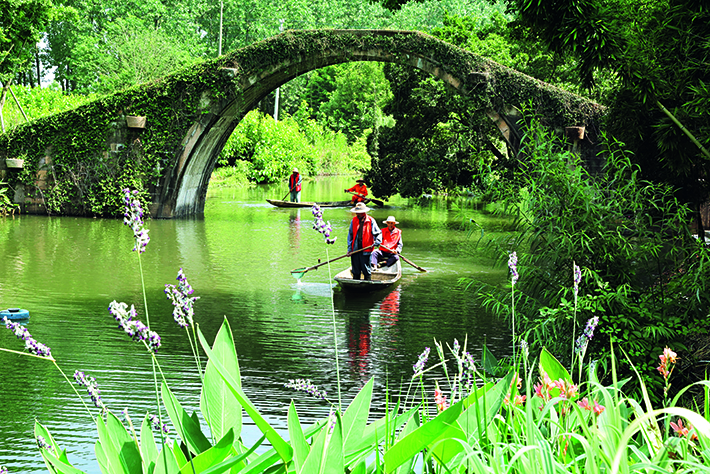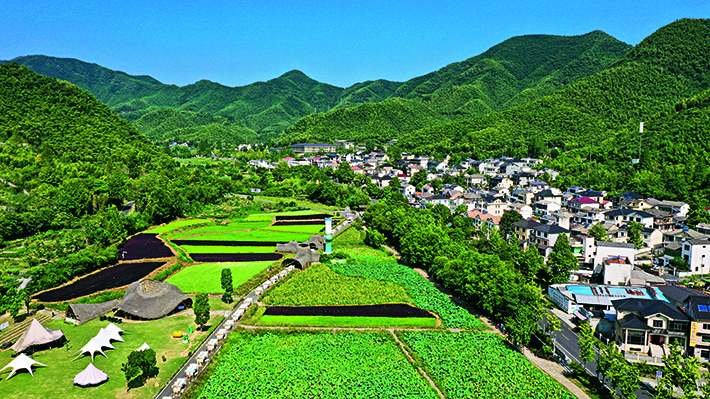A green champion

Rubbish is being removed from a river in the village of Xingfu, Huzhou City, Zhejiang Province, on 2 June
In August 2005, Xi Jinping, then Party chief of Zhejiang Province, paid a visit to the small, beautiful, forest-clad hillside town of Anji, about an hour’s drive from Zhejiang’s capital city Hangzhou. Before an audience of maybe 30 people, Xi spoke about the importance of taking care of nature, and famously said that lucid waters and lush mountains are as invaluable as silver and gold.
With the benefit of his hindsight, the Anji speech can be seen as a watershed moment in modern Chinese history. At the time, which was 20 years ago, economic growth in China was accompanied with a lot of pollution. Now China is a world leader in green growth. At the time the entire focus of China, understandably, was on high growth to bring all Chinese out of poverty. Now it’s all about high-quality growth.
The green transformation of China in the last decade stands out in the world. No other nation has embarked upon green development with the same speed and determination.
Green transformation
Hardly any county in China shows this wonderful path better than Pujiang in central Zhejiang. I had the joyful opportunity to visit in 2017 as head of the UN Environment Programme and was simply taken aback. I saw an amazing example of how to introduce a green revolution in rural communities. The Zhejiang Rural Green Revival Programme stood out as a world leading best practice.
As part of the Yangtze River Basin, Zhejiang experienced horrible pollution up to only two decades ago. Pollutants in the rivers dyed the water white, so they were called “milky rivers.”
Now, Zhejiang has become a shining example of how China has “waged war” on pollution.
Building on the experience of pilot programmes in Huzhou, Quzhou, Jiaxing and Wenzhou in Zhejiang, China rolled out the scheme in 2016 on a greater scale, when the top leadership decided to assign each waterway in the country a specific steward, or river chief.
Under the system, river chiefs are responsible for resource protection, pollution prevention and control, and ecological restoration. They are held accountable for water pollution on their watch. Their phone numbers are publicly available so that anyone can contact them about pollution-related activities.
Today, over 97 percent of villages in Zhejiang have transformed their polluted waterways into rivers with clean and drinkable waters, benefitting 30 million residents. The rivers became so clean that you can ask your young child to take a bath, go for a swim, or even swallow some water.
Reviving the waterways brings multiple benefits to the people. It changed the lifestyle of local residents. Amidst the beautiful living environment, you can take a nice walk along rivers and canals. Many tourists come to see temples and beautiful scenery. Tourism brings revival of the rural economy. A polluted landscape has been turned into a green paradise.
When I saw this, I immediately felt we in the UN should honour Zhejiang’s Rural Green Revival Programme the United Nation’s highest environment award, Champion of the Earth prize.
This is truly a triple win formula - good for Mother Earth, for improving people’s livelihoods and health, and for growing the economy and creating jobs. Some 200 million people live within a few hours’ drive from central Zhejiang, so opportunities for tourism are enormous.
The Yangtze River Basin feeds one-third of the Chinese population and produces over 40 percent of the country’s GDP. So restoring its ecosystem after being seriously affected by rapid and unsustainable economic growth is paramount. Now programmes like this and the 10-year fishing ban in the Yangtze River basin promise to restore and revive one of the most precious ecosystems on the planet.

Photo taken on 14 August 2022 shows a park transformed from a mining site in Huzhou City, Zhejiang Province
Secret of success
What is the success formula of Zhejiang? Political leadership is key. The nationwide river chief system has been a major reform measure proposed and promoted by President Xi. Here are some lessons that can be learned by other nations:
First, change can happen fast. Much of the same positive change has happened in Europe. The Rhine, the Danube, the Seine, and the Thames are all now cleaner than they have been for hundreds of years. But progress took longer time in Europe. What took 10 years in Zhejiang took 40-plus years in Europe. With political will and dedicated leadership, change can happen much faster than most people think.
Second, fighting pollution is win–win, because the result is good for the economy, and good for the ecology. You need to put people and nature first, and not stick with the old-style growth. It is so important that China now emphasises a new growth paradigm: high-quality growth. The new growth model will lead to better life, more jobs, and better ecology.
Third, accountability is essential. That is why river chief system is so inspiring. You know who are responsible, not just an invisible bureaucracy.
The world is not short of polluted rivers. The Ganga River which runs through vast areas of India with dense population is one. The Indian government initiated the National Mission for Clean Ganga with the same rationale of cleaning a beautiful waterway and restoring nature. Many rivers running through cities in Southeast Asia, Africa and Latin America are covered with plastics. Zhejiang shows how fast change can happen if you are dedicated to fixing the problem. Water is the most precious of all resources. Humans and a vast number of species can survive only very shortly without it. Protecting waterbodies and wetlands is among the most important environmental issues of our time. Zhejiang has showed us the way.
Zhejiang has led China and the world before. Now Zhejiang is leading us into the green transformation of the 21st century.

